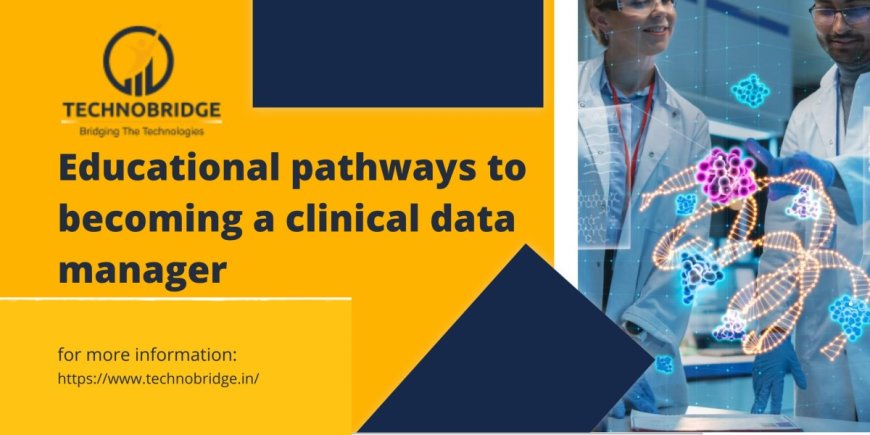How Can I Pursue a Career as a Clinical Data Manager Through Education?
Find out what courses are necessary to become a clinical data manager. Discover the necessary education, training, and certifications to launch a lucrative career in the administration and analysis of clinical trial data for pharmaceutical development.

As a clinical data manager job is demanding and fulfilling; it calls for a combination of technical proficiency, scientific knowledge, and in-depth comprehension of clinical trials. The first step to establishing a prosperous career in this profession, if you're interested, is education. The educational paths accessible to become a Clinical Data Manager will be walked through in this article.
Undergraduate Degrees
Having a solid college background is frequently the first step toward a rewarding job as a clinical data manager. A bachelor's degree in a related profession can give you important information and abilities, while it's not necessary. The biological and biomedical sciences, computer science, statistics, and mathematics are popular choices. Understanding clinical trial procedures and handling complicated datasets need the application of scientific ideas, critical thinking, and problem-solving skills, all of which are taught in these programs.
The following are common undergraduate majors:
• Life Sciences, which include genetics, biology, biochemistry, and microbiology.
• Computer Science: For individuals with an interest in data management's technological facets.
• Statistics: To establish a solid basis for data analysis.
• Mathematics: For positions involving sophisticated statistical modeling.
• Health Sciences: Public health, education in pharmacy, or nursing.
These degrees give you the scientific understanding, analytical capabilities, and problem-solving aptitude needed to comprehend clinical trial procedures and handle intricate datasets.
Graduate Degrees
Gaining a graduate degree will greatly improve your chances of becoming a clinical data manager. It offers in-depth information and specific abilities, but it's not required. Suitable master's degrees consist of:
• Master of Science in Clinical Research:
Provides in-depth understanding of data management, trial design, and conduct.
• Master of Science in Biostatistics:
Offers sophisticated statistical knowledge essential for interpreting and analyzing data.
• Master of Science in Information Systems:
Emphasises software applications, database design, and data management.
• Master of Business Administration (MBA):
Provides leadership and business expertise, which are useful for CDM positions including managerial duties.
Specialized Courses and Certifications
Think about enrolling in specialized online courses and certification in clinical data management and earning pertinent certifications to supplement your degree:
• Clinical Data administration Courses:
It is essential to receive specific training in Clinical Data Management (CDM) to supplement your academic background. These courses offer in-depth understanding of industry norms and practices along with practical experience.
• Proficiency with Statistical Software:
Acquire the ability to analyze data using statistical software programs such as SAS, R, or SPSS.
• Database Management Systems:
Develop your knowledge of database management systems like MySQL, SQL Server, and Oracle.
• Clinical Data Management Certifications:
Your knowledge and abilities are validated by certifications such as the Certified Clinical Data Manager (CCDM), which is provided by the Society for Clinical Data Management (SCDM).
Practical Experience
In addition to formal education, hands-on experience is invaluable. Consider internships, research assistant positions, or entry-level roles in clinical research organizations (CROs) or pharmaceutical companies to gain practical exposure to clinical data management.
Technobridge.in: Technobridge is online learning institute which provide many courses related to clinical field. Such as clinical research, pharmacovigilance, clinical data management, GCP training, medical writing and medical coding at affordable rate.
An Ordinary Clinical Data Manager's Day
A typical workday for a clinical data manager include supervising the gathering, arrangement, and evaluation of data associated with clinical trials or medical research projects. They begin by going over the procedures for gathering data and making sure that the rules are being followed. They administer databases, work with clinical research teams to resolve data conflicts, and do quality checks to ensure data integrity throughout the day. Since they frequently work with statisticians, researchers, and regulatory bodies to guarantee accurate reporting and adherence to study procedures, communication is essential. They might also take part in meetings where topics like strategy modifications, project schedules, and data trends are discussed. As they deal with unforeseen problems like data anomalies or protocol modifications, flexibility is essential to ensuring that all tasks lead to the successful completion of clinical trials.
An Ordinary Clinical Data Manager's Day
Clinical data managers, who are in charge of the careful administration of enormous volumes of data, are the foundation of clinical trials. Among their daily obligations are:
Data cleaning and validation: Finding and fixing mistakes to ensure data consistency and accuracy.
Creating and managing databases to hold clinical trial data is known as database management.
Data analysis: Working together to produce reports and evaluate data with statisticians.
Following the recommendations for Good Clinical Practice (GCP) and other regulatory obligations is known as regulatory compliance.
Project management: Supervising clinical trial data management tasks.
Working closely with statisticians, programmers, and clinical research teams is an example of team collaboration.
The Value of Complementary Skills
Excellent interpersonal and communication skills are equally as important for CDMs as technical skills. Success in this role requires the ability to work successfully in cross-functional teams, solve problems, and communicate coherently.
Prospects for Employment and Pay
The growing number of clinical studies conducted worldwide is driving up demand for clinical data managers. There are tremendous prospects for career progression and attractive compensation in this field. Advanced degrees, certifications, and a wealth of experience enable CDMs to command better pay and take on leadership roles in the sector.
In summary
A strong academic background, real-world experience, and a commitment to lifelong learning are necessary for becoming a clinical data manager. People can establish a fulfilling career in this important profession by obtaining necessary degrees, certificates, and practical training. Success requires the capacity to efficiently handle intricate datasets, maintain data integrity, and work with cross-functional teams. The clinical data manager will continue to play a critical role in providing patients with medicines that could save their lives as the healthcare sector develops.












